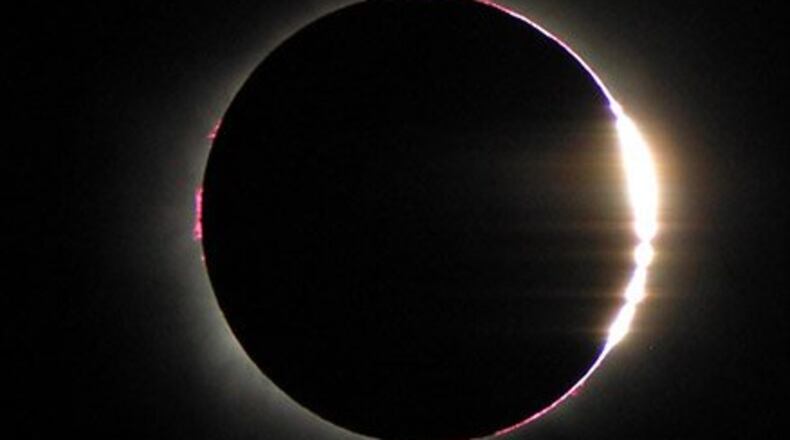Think of Monday afternoon’s eclipse as the quiet before the storm.
Life will surely come to a standstill at 2:35 p.m. as Atlantans lift their gaze to observe the dark side of the moon when it blocks nearly all of the sun.
Then, boom, it’ll be rush hour. And it’ll probably be a doozy, aggravated by late school buses pouring onto the streets.
Due to safety concerns — driving and releasing kids onto the streets in the dark, while drivers are distracted by a unique celestial experience — schools will be releasing half an hour to an hour later, as the sun returns.
Also, of course, it’s a historic learning opportunity, and educators are making plans to help students experience it from the safety of campus.
Atlanta Public Schools, for instance, has taken 50,500 of those cardboard and film eclipse glasses off the market, ordering 50,000 and getting another 500 in a donation.
APS dodged the Amazon.com controversy that tripped up another metro Atlanta district. The Coweta County School System had to return the 24,000 eclipse glasses it had purchased from an online retailer over concerns about Amazon's recall of the company's product.
Atlanta schools science coordinator Rabieh Hafza said through a district spokeswoman that APS purchased its glasses directly from Rainbow Symphony, one of three vendors recommended by NASA. (The other two are Thousand Oaks Optical and American Paper Optics, which set a goal last year to sell 100 million glasses for this eclipse.)
Atlanta, like other metro Atlanta districts, is compiling a grade-specific solar eclipse teacher’s manual, with background and safety knowledge.
In Gwinnett County, the state’s largest school district, elementary school students will be tasked with determining how the tiny moon can block the massive sun from view and why the duration of each day changes throughout the year. Some middle school students will make models of a solar and lunar eclipse, while peers in high school create time-lapse videos of the event.
In neighboring DeKalb County, where the school district is in the unusual position of owning a planetarium (with a new 4K Laser projection system), an observatory and even a NASA Apollo space capsule, the expert staff is preparing as many as 100 teachers for the eclipse while also laying out telescopes for the adults who visit on the big day. (The kids will remain in their schools for the aforementioned safety reasons.)
The teachers will be able to explain to their students how scientists will be exploiting the eclipse for research.
“They’re important science-wise,” said Doug Hrabe, the Fernbank Science Center director. “They’re not just cool to look at.”
Metro Atlanta school districts will release students later than usual; here’s how much later:
Atlanta: 30 minutes
Clayton County: 45 minutes
Cobb County: 45 minutes
Decatur: 30 minutes
DeKalb County: one hour
Fulton County: 45 minutes
Gwinnett County: one hour
Marietta: 15 minutes
For general information about the event, visit one of these related links:
Staff writer Eric Stirgus contributed to this article ajc.com.
About the Author
Keep Reading
The Latest
Featured



